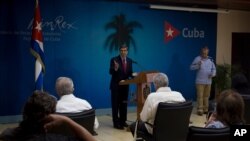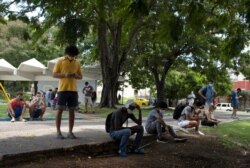Cuba’s government said Tuesday one person has died after anti-government protests, while rights groups said authorities have arrested more than 100 people.
The government said a 36-year-old man died Monday during a clash between protesters and police in Arroyo Naranjo, on the outskirts of Havana.
The Cuban capital had a heavy police presence Tuesday, two days after demonstrators there and in other parts of the country conducted the largest anti-government protests in decades.
Protesters expressed their frustration with food shortages, high prices, electricity outages and the government’s response to the coronavirus pandemic.
Cuban state media said Tuesday that former leader Raul Castro had met Sunday with President Miguel Díaz-Canel and the rest of the ruling Communist Party’s leadership to discuss the protests.
Díaz-Canel and other officials have blamed the unrest on the Cuban Americans on social media and the United States government’s decades-long embargo on Cuba. Sanctions and restrictions imposed by former U.S. President Donald Trump and a drop in tourism related to the pandemic have put extra pressure on the Cuban economy in recent years.
U.S. State Department spokesman Ned Price said at a briefing Tuesday that the protesters are “standing up to Cuba’s authoritarian regime.”
“Their basic needs are not being met and they are understandably exhausted,” Price said.
Internet monitoring firm NetBlocks said Tuesday that the Cuban government had restricted access to a number of mobile messaging and social media services, including Facebook and WhatsApp.
Cuban Foreign Minister Bruno Rodriguez denied the government was shutting off access.
“We have had electricity problems. We have communication problems; connectivity problems,” Rodriguez said Tuesday. “And it is true that we are in a complex situation, and it is true that there has been a lack of electricity these days, which also affects the functioning of the networks of the telecommunications server nodes.”
Price said the United States is calling on Cuba to open “all means of communication.”
“Shutting down technology, shutting down information pathways, that does nothing to address the legitimate needs and aspirations of the Cuban people,” he said.
The United States is also discouraging any potential attempts by people in Cuba to try to leave the island nation by boat and reach U.S. shores.
“Any migrant intercepted at sea, regardless of their nationality, will not be permitted to enter the United States,” Homeland Security Secretary Alejandro Mayorkas told reporters Tuesday. “This risk is not worth taking.”
Mayorkas said at this point there has been no indication of an increase in migration attempts by sea.
Some information for this report came from the Associated Press, AFP and Reuters.









